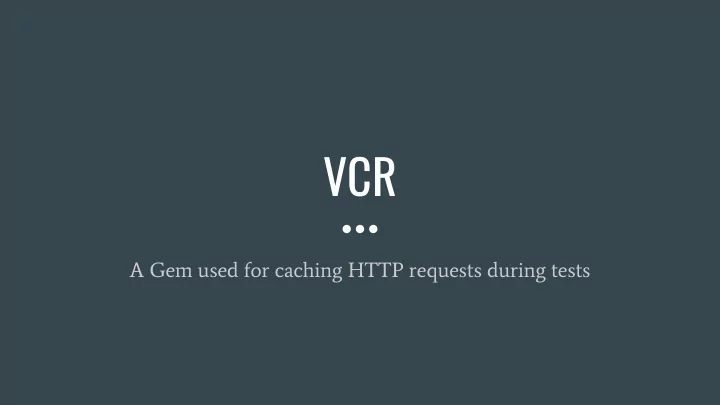

VCR A Gem used for caching HTTP requests during tests
Who am I? Mike Dalton ● Developer @ GrubHub ● ● Using Ruby for 7 years Frequent attendee of meetups ●
The problem Tests should be deterministic ● Result of an HTTP request might not be known ● ○ Change in data beyond your control Network connectivity issues ○ ● How do we have deterministic tests that involve 3rd party web services?
The solution VCR Gem ● https://github.com/vcr/vcr ● ● Created by Myron Marston (maintainer of RSpec) Around since 2010 ● Record your test suite's HTTP interactions and replay them during future test ● runs for fast, deterministic, accurate tests.
Examples
First example Query all issues from a GitHub repository
Create first GitHub Issue
Test for Issue.all require 'test_helper' class IssueTest < ActiveSupport::TestCase def test_all_issues issues = Issue.all assert_equal 1, issues.count end end
Implementation of Issue.all class Issue include ActiveModel::Model REPOSITORY = 'https://api.github.com/repos/kcdragon/vcr-presentation' attr_accessor :title def self.all uri = URI.parse("#{REPOSITORY}/issues") response = Net::HTTP.get_response(uri) JSON.parse(response.body).map do |issue_data| Issue. new ( title: issue_data['title'] ) end end end
Result of running test
Create second GitHub Issue
Result of running test
VCR to the rescue! require 'test_helper' # test/test_helper.rb class IssueTest < ActiveSupport::TestCase VCR.configure do |config| config.cassette_library_dir = 'test/cassettes' def test_all_issues config.hook_into :webmock issues = VCR.use_cassette('issue/all') do end Issue.all end assert_equal 2, issues.count # Gemfile end end gem 'vcr', '3.0.3' gem 'webmock', '3.0.1'
How does this work? First time test is run: ● HTTP request is performed ○ VCR creates a YAML file (called a “cassette”) to store request and response ○ Second time test is run: ● ○ VCR recognizes the same request is being made VCR uses YAML file to return the response ○
Cassette file YAML format ● Contains both the HTTP request and response ● ● Single YAML file can contain multiple requests Each request must have a response ● Single YAML file can be used in multiple tests ●
Cassette for Issue.all request/response --- http_interactions: - request: method: get uri: https://api.github.com/repos/kcdragon/vcr-presentation/issues ... response: status: code: 200 message: OK headers: ... body: encoding: ASCII-8BIT string: '[{...}]' http_version: recorded_at: Mon, 17 Apr 2017 19:08:29 GMT recorded_with: VCR 3.0.3
Second example Create an issue via the GitHub API ● Check that issue has been created ●
Test for Issue.create require 'test_helper' class IssueTest < ActiveSupport::TestCase def test_create_issue title = 'Issue created from API #1' issue = Issue. new (title: title) VCR.use_cassette('issue/create') do Issue.create(issue) # first HTTP request issues = Issue.all # second HTTP request issue = issues.first assert_equal title, issue.title end end end
Implementation for Issue.create class Issue include ActiveModel::Model REPOSITORY = 'https://api.github.com/repos/kcdragon/vcr-presentation' attr_accessor :title def self.create(issue) uri = URI.parse("#{REPOSITORY}/issues") request = Net::HTTP::Post. new (uri) request.body = JSON.generate(title: issue.title) request.basic_auth("user", "token") Net::HTTP.start(uri.hostname, uri.port, use_ssl: true ) do |http| http.request(request) end end end
Result of running test
“Accidentally” introduce a bug class Issue # ... def self.create(issue) # ... request.body = JSON.generate(title: nil) # ⇐ Change `issue.title` to `nil` # ... end end
Result of running test
We changed the application code but the tests still pass? VCR default matching ● URI ○ HTTP Method (GET, POST, etc) ○ Need to tell VCR how to match ●
Test for Issue.create require 'test_helper' class IssueTest < ActiveSupport::TestCase def test_create_issue # ... VCR.use_cassette('issue/create', match_requests_on: %i(uri method body)) do # ... end end end
Result of running test
Third example Query GitHub for important bugs
Create an important bug issue in GitHub
Test for Issue.important_bugs require 'test_helper' class IssueTest < ActiveSupport::TestCase def test_important_bug_issues issues = VCR.use_cassette('issue/important_bugs') do Issue.important_bugs end assert_equal 1, issues.count end end
Implementation for Issue.important_bugs class Issue # ... def self.important_bugs uri = URI.parse("#{REPOSITORY}/issues?labels=bug,important") response = Net::HTTP.get_response(uri) JSON.parse(response.body).map do |issue_data| Issue. new ( title: issue_data['title'] ) end end end
Result of running test
“Refactor” some code class Issue # ... def self.important_bugs uri = URI.parse("#{REPOSITORY}/issues?labels=important,bug") # ⇐ Change “bug,important” to “important,bug” # ... end end
Uh-oh...
Two solutions Delete the existing cassette and generate a new cassette ● May require changing the test ○ Use a “custom matcher” to accept any ordering of labels ● There is no built-in matcher for our specific need ○
Custom matcher for “labels=bug,important” in query string VCR.configure do |config| # ... config.register_request_matcher :label_in_query_string do |request_1, request_2| # extract labels=bug,important from query string labels_in_query_string = ->(request) do query_string = URI.parse(request.uri).query query_string.split('&').reduce({}) do |memo, pair| key, value = pair.split('=') memo.merge(key => value) end ['labels'] end labels_1 = labels_in_query_string.(request_1) labels_2 = labels_in_query_string.(request_2) labels_1.split(',').sort == labels_2.split(',').sort end end
Test for Issue.important_bugs require 'test_helper' class IssueTest < ActiveSupport::TestCase def test_important_bug_issues issues = VCR.use_cassette('issue/important_bugs', match_requests_on: %i(path label_in_query_string)) do # ... end # ... end end
Result of running test
Summary First example ● GET requests ○ Second example ● POST requests ○ ○ `match_requests_on` Defaults: URI, method ■ ● Third example Delete cassette file to regenerate ○ Custom matchers ○
Thanks!
Recommend
More recommend